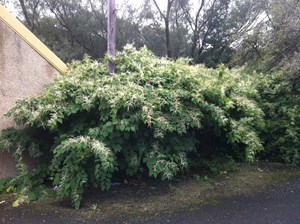Japanese Knotweed
First introduced by the Victorians, this giant weed with purple shoots and bamboo like stems can grow up to 10cm per day and several metres high in season. There is no natural control for it and it is estimated that around £150 million was spent last year in Britain on preventative measures to stop it spreading.
 What's so terrible about Japanese
Knotweed?
What's so terrible about Japanese
Knotweed?
There have been various horror stories in the media about the way it exploits weaknesses in building structures and compromises them by growing through them. Like some type of cartoon monster plant, it has the ability to grow through walls, tarmac and concrete. It can also create a risk of flooding if it clogs waterways.
Could the sale of our house fall through because we have Japanese knotweed in the garden?
Lenders are very sensitive to properties where Japanese Knotweed has been identified in the garden or on adjoining land, and often severely restrict their lending or refuse to lend at all. There is good news however - your Home Report should note whether there is any Japanese Knotweed in the locale of any property you are seeking to buy giving you advance warning of the problem. There are also specialists out there who can examine it and advise as to the risk it presents.
What if we just cut it all down and try to hide it?
You are quite at liberty to remove any knotweed from your land, subject to it being done in accordance with the law. Removing it might fool some surveyors, but most will still be able to identify its presence. Also, you are bound to disclose during the conveyancing process any issue which might be prejudicial to a purchaser. This would include disclosures about Japanese Knotweed.
What is the legislation about Japanese Knotweed?
It is not against the law to have Japanese Knotweed growing on your land but it is against the law to "plant or otherwise cause" Japanese Knotweed to grow in the wild (The Wildlife and Countryside Act (WCA) section 14(2)). Japanese Knotweed is also classed as 'controlled waste' in terms of the Enviromental Protection Act 1990. It must be disposed of safely at a licensed landfill site and buried to a depth of at least 5m. A waste carrier registered with the Enviromental Agency can deal with the disposal.
Article by Sara Jalicy of Balfour+Manson.